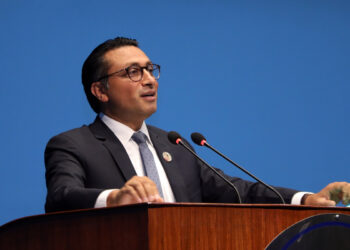Immunotherapy is a treatment that uses certain parts of a person’s immune system to fight diseases such as cancer. This is a most recent treatment option modality available for cancer patients with fantastic results. Immunotherapy can be done in 2 ways:
i. Stimulating the patient’s own immune system to work harder or smarter to attack cancer cells
ii. Giving the patient immune system components such as man made-immune system proteins
How does immunotherapy work?
An important part of our immune system is its ability to tell between normal cells in the body and those it sees as ‘foreign’. This lets the immune system attack the foreign cells while leaving the normal cells alone. To do this, it uses ‘checkpoints’ – molecules on certain immune cells that need to be activated to start an immune response.
Cancer cells sometimes find ways to use these checkpoints to avoid being attacked by the immune system. But drugs that target these checkpoints hold a lot of promise as cancer treatments.
Which patients are benefitted by immunotherapy?
Most oncologists are very excited about immunotherapy. It has revolutionized the approach to patients in certain types of cancers like:
• Lung cancer
• Breast cancer
• Head and neck cancers
• Lymphomas & Melanomas
• Colorectal cancer
• Kidney and prostate cancers
Types of cancer immunotherapy?
Monoclonal Antibodies: These are man made versions of immune system proteins. Antibodies can be very useful in treating cancer because they can be designed to attack a very specific part of a cancer cell. For example, Alemtuzumab (to treat CLL), Trastuzumab (used in breast cancer), Brentuzumab (used in Hodgkin’s Lymphoma) etc.
Immune check point inhibitors: These drugs basically take the brakes off the immune system, which helps it recognize and attack cancer cells. Programmed Death-1 ( PD-1) is a checkpoint protein on immune cells called T cells. It normally acts as a type of ‘ off switch’ that helps keep the T cells from attacking other cells in the body. It does this when it attaches to PD-L1, a protein on some normal cells. When PD-1 binds to PD-L1, it basically tells the T cells to leave the other cell alone. Some cancer cells have large amounts of PD-L1, which helps them evade immune attack.
Monoclonal antibodies that target either PD-1 or PD-L1 can block this binding and boost the immune response against cancer cells. These drugs have shown a great deal of promise in treating certain cancers. Examples include:
PD-1 inhibitors – Pembrolizumab (KEYTRUDA), Nivolumab (OPDYTA)
PD-L1 inhibitor- Atezolizumab TECENTRIQ), Durvalumab
Cancer Vaccines: These vaccines try to get the immune system to mount an attack against cancer cells in the body. Instead of preventing disease, they are meant to get the immune system to attack a disease that already exists.
Some cancer treatment vaccines are made up of cancer cells, parts of cells or pure antigens. Sometimes a patient’s own immune cells are removed and exposed to these substances in the lab to create the vaccine. Once the vaccine is ready, it’s injected into the body to increase the immune response against cancer cells.
SIPULEUCEL-T is the only vaccine approved in the US to treat cancer so far. It is used to treat advanced prostate cancer that is no longer being helped by hormone therapy.
Adoptive T Cell Therapy (ACT):
The goal is to generate a robust immune-mediated anti-tumor response through the infusion of ex vivo manipulated T cells which destroy tumors. Tumor-infiltrating lymphocytes (TIL)-derived T cells or T cells genetically engineered to express tumor recognizing receptors have been utilized as a powerful and potentially curative therapy for several cancers particularly acute leukemias and B cell lymphomas.
Dendritic Cell Therapy (DCT)
Dendritic cells (DC) are a specialized family of antigen presenting cells with the unique ability to initiate and maintain primary immune responses when pulsed with antigens. DC vaccination is a newly emerging and potent form of cancer immunotherapy and has clinically relevant mechanisms of action with great potential for the systemic treatment of cancers like gastrointestinal tumors particularly hepatocellular carcinoma and pancreatic adenocarcinoma.
Dendritic cell vaccines are made from the person in whom they will be used. The process used to create this type of vaccine (known as an autologous vaccine) is complex and expensive. Doctors remove some immune cells from the patients’ blood and expose them in the lab to cancer cells or cancer antigens, as well as to other chemicals that turn the immune cells into dendritic cells and help them grow. The dendritic cells are then injected back into the patient, where they cause an immune response to cancer cells in the body.
Bio-markers for immunotherapy?
Biomarkers are needed to improve the selection of patients who will best respond to immunotherapy, further elucidate drug mechanisms of action, and help tailor therapy regimens. Biomarkers are being explored at the soluble, cellular, and genomic levels. Examples in immunotherapy include serum proteins, tumor-specific receptor expression patterns, factors in the tumor microenvironment, circulating immune and tumor cells, and host genomic factors. Both tumor infiltrating lymphocytes( TILs) and PD-L1 expression within the tumor microenvironment have been recognized as having both prognostic and predictive value for patients treated with immunotherapy.
What are the side effects of Immunotherapy?
Infusion reactions- Fever with or without chills, flushing, shortness of breath or wheezing
Diarrhea, vomiting, decreased appetite
Erythematous rashes and rarely Stevens Johnson syndrome
Enterocolitis, mild to moderate hepatitis
Thyroid disorders, pneumonitis, immune mediated cytopenias
Headache, seizure, neuropathies, etc
Immunotherapy Scope in Nepal
As discussed above immunotherapy is the most recent treatment option in cancer management with excellent outcomes in certain cancers. The limiting factor for its usage is the costs and availability of drugs.
Immunotherapeutic drugs like checkpoint inhibitors, monoclonal antibodies, and Dendritic cell therapy are being routinely used in Nepal as well. Results so far have been encouraging.
Future Perspective
Progress in the field of immunotherapy for cancer has been breathtaking since the approval of Ipilimumab for melanoma in 2011, yet benefit in most cancers has been incremental. Currently, there are hundreds of combination immunotherapy trials in progress with checkpoint inhibitor antibodies as the backbone treatment. In the future, virtually all patients will receive combination immunotherapy or targeted + immunotherapy in which the choice and sequencing of agents will be driven by biomarkers, both derived from the tumor and in the periphery.
Precision immunotherapy, Adoptive cell therapy, neo-antigens, novel antibodies & cytokines, and adjuvant immunotherapy will come in a big way in the near future.









Comment